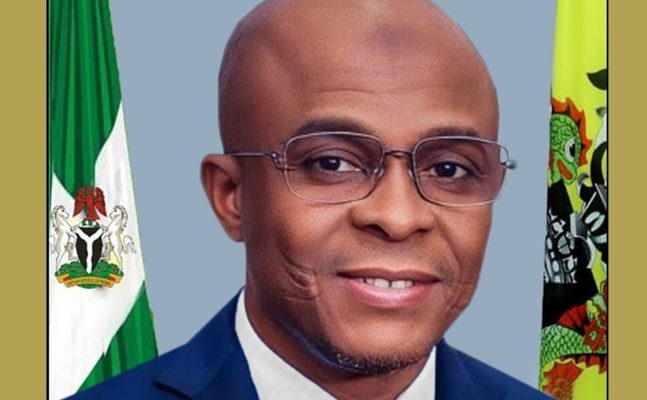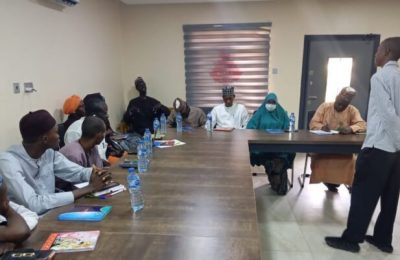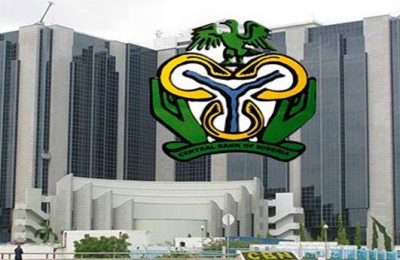The Managing Director of the Nigerian Ports Authority (NPA), Dr Abubakar Dantsoho has advocated for among other measures, the sustained pursuit and completion of international highway, rail routes cutting across Hinterland and Coastal, such as the Niger, Lagos, Tema and Abidjan to ensure service provision to the landlocked states efficiently and at reduced cost.
He stated this on Tuesday in his presentation at the 44th annual council and 19th roundtable of Directors General of the Port Management Association of West and Central Africa (PMAWCA) holding in Conakry-Guinea.
The NPA boss who noted that out of the 44 landlocked countries globally, Africa accounts for 16, said it is a moral duty for the coastal states to provide access to the sea for the landlocked countries.

According to the NPABoss, “The question thrown by emerging trends and the current roundtable is more like servicing the Hinterland without scrambling for the service on one hand and how to build shared capacity by coastal states to ensure service provision to the landlocked states efficiently and at reduced cost.
“In doing the above, there should be sustained and sincere agenda to engage in the following: Sustained pursuit and completion of the International Highway routes cutting across Hinterland and Coastal, such as the Niger, Lagos, Tema and Abidjan International Highways, sustained creation of common International Rail routes cutting across Hinterland and Coastal States.”
Others, he added, are; leveraging on the strength of each other to improve on trade facilitation to landlocked countries, sharing of ideas and information on advancement in technology that can result to enhancement of service delivery, technological connectivity between littoral states to expedite transit cargo transportation particularly where multiple transit by water is required within the sub region.
“Establish multilateral agreements and trading partnerships with neighbouring coastal countries and other regional partners, infrastructure planning: coordinating investments in port infrastructure and transportation networks. The proposed Abidjan to Lagos highway by ECOWAS Heads of State which will link the most economically dynamic cities and ports and the most densely populated urban areas in West Africa is a welcome development.
“Regulatory harmonization: Aligning policies and procedures to facilitate smooth cargo movement. This is critical for transshipment cargo, joint initiatives for security, safety, and environmental protection. This is critical for attracting and sustaining economic development, combining cargo volumes to negotiate better rates with shipping lines, aligning vessel schedules to reduce congestion and increase efficiency. Ports in the region, particularly the Shippers’ Councils must continue to work together on this.”

He also called for, “sharing best practices for terminal operations and capacity utilisation, collaborating on rail, road and inland waterway connections, emergency response planning: Joint contingency planning for accidents or disruptions and engaging in diplomatic and cultural exchange programs: Good relationships foster trust and cooperation.”
He stressed that benefits such as; increased efficiency, improved competitiveness, enhanced customer satisfaction, reduced costs and better utilisation of resources can be derived if the strategic and operational complementaries are synergised.
“From the foregoing it is clear that the relationship between maritime shipping and the hinterland is interdependent, which implies that surmounting the challenges associated with fluidity of Port operations requires a strong nexus between the maritime space and the hinterland as the two constitute the domain of global freight circulation. Conclusively, ensuring the full optimization of Hinterland Connectivity, requires a diverse approach that combines infrastructure development, digital advancement and diplomatic cooperation measures which I believe PMAWCA is thoroughly equipped and is poised to foster,” he stated.
Speaking, the Managing Director of the Port Autonome de Conakry, Mamadou Biro Diallo said Ports are key hubs for world trade and catalysts for growth.
”But for this growth to be truly beneficial, it must extend beyond the port interface into the hinterland. This is where connectivity and the fluidity of logistics chains play a decisive role. Connectivity between the ports and the hinterland is based on a varied infrastructure network, including roads, railways and sometimes even waterways.
”That’s why the Port Autonome de Conakry is giving pride of place to these challenges, which also involve supporting the development efforts of hinterland countries by offering quality services. Optimising port hinterland services requires an integrated vision of connectivity, fluidity and reliability. This requires strong collaboration between public and private players, a commitment to sustainable investment in infrastructure and greater adoption of new technologies. Together, we can meet these challenges and build more efficient supply chains that will support not only local economies but also global trade,” he stated.







